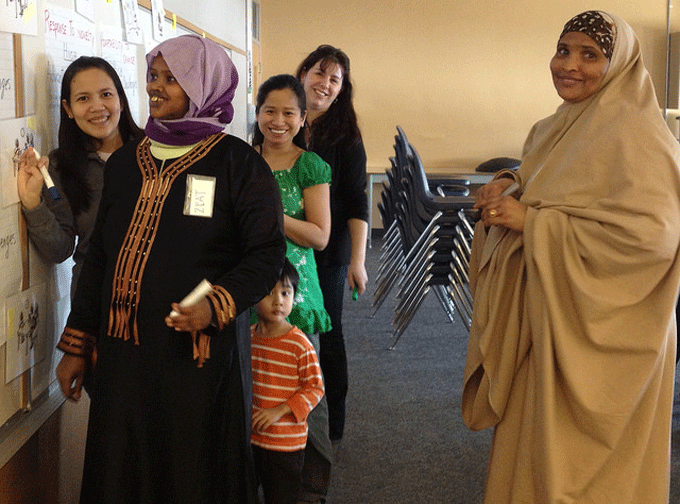In Vancouver, scientists are turning power drills into sterile surgical tools, in Montreal they’re transforming disaster response, meanwhile in Saskatoon, researchers are using plants to stave off cavities.

The three projects are only a few of the made-in-Canada ideas aiming to solve health care problems in developing countries. On Monday, Grand Challenges Canada poured $2.4 million in seed money into 22 innovations out of Canada and other parts of the world.
The projects are selected through an independent peer review. They’re meant to address major health issues affecting the developing world – tuberculosis, mental health concerns and liver and thyroid disease, for example.
READ MORE: 6 Canadian game-changing ideas for global health care
Typically, each team gets a $100,000 grant meant to help with proof-of-concept work. After that, some projects are topped off with more funding. Ultimately, the findings could be implemented worldwide. Since 2011, Grand Challenges Canada has funded some 400 projects.
Global News took a look at five made-in-Canada proposals:
Turning power tools into sterile surgical tools using drill covers
About 20 to 50 million people each year are injured in traffic accidents, according to the World Health Organization. Ninety per cent of the time, these incidents happen in the developing world that has only 10 per cent of the world’s health resources to work with.
READ MORE: 5 Canadian innovations that could change the face of global health care
University of British Columbia scientists saw the result firsthand: public hospitals had limited equipment and surgeons juggled between one “sterile hand” and one “unsterile hand.” So they developed a waterproof, sterilized covering that would transform commercial power drills into $30,000 surgical equipment. An adapter is even applied to the drill’s nose to create a barrier.
The project will be tried out in Uganda, Haiti and Malawi.
Using edible plants to fight cavities
Getting cavities isn’t just a concern for young kids – more than one-third of the world is dealing with tooth decay and cavities in permanent teeth. University of Saskatchewan researchers say large increases are being recorded in the developing world, too.
The scientists at the university say they’ve figured out a cost-effective and easy-to-engineer way to fight dental caries. To get rid of bacteria, they’ve developed synthetic antibodies – created with edible plants – that’ll block bacteria, sugar and acid from sticking to teeth.
Their whiteboard video explains their project clearly:
Ushering in a new way of managing resources post-disaster
As the Ebola outbreak rages on in West Africa, this is perhaps the most relevant, timely project. Montreal scientists are gearing their project towards humanitarian response in a disaster, and touch on a key point: communication, planning and organization are critical.
The Quebec Medical Association researchers came up with HumanIT3D – a GIS or geographic information system – that could be used during crises or disasters. It’s mobile, interactive, in 2D or 3D and can be used for planning and decision-making between emergency response teams in the field and their supporting NGOs. They can decide where hospital beds, temporary housing, and other resources should go.
They’re hoping it’s a game-changer for disaster planning and emergency situations. They’ve already collaborated with the Red Cross to make sure it works in simulation and real life scenarios.
Changing the way the world’s parents look at spanking
Winnipeg researchers have been studying physical punishment on children for decades. By 2006, one University of Manitoba researcher was recruited by Thailand’s Save the Children to create a program that would help parents understand the psychological and physical effects of hitting, spanking and shaking their kids.
That program’s now called Positive Discipline in Everyday Parenting (PDEP) and it’s already available in 32 countries, such as Canada, Mongolia, Liberia and Papua New Guinea. The researchers say it even takes into consideration the cultural differences between nations.
But the next step is to scale up the project in several countries while maintaining the integrity of the program. The scientists are hoping to prepare their facilitators so they’re ready to train in their home countries. The scale-up is starting in Kenya, Kosovo and Canada.
Helping those with hearing impairment listen with the eyes
It sounds too good to be true, but Toronto scientists are working on tools and training courses that’ll help the hearing impaired “hear” in real time. The researchers say their initial University of Toronto field trial was a success, too.
Some 32 million kids suffer from hearing loss globally, and 80 per cent are in the developing world. They go on to deal with social isolation, mental health issues and struggle to find employment. Keep in mind, hearing aids and implants are invasive, expensive and out of reach for people in many parts of the world. Sign language also isn’t widely understood, the scientists say.
The Canadian researchers are relying on tools such as Google Glass, tablets and laptops to help them bridge the gap. Sound signals are collected from a microphone, then transferred into visual signals that are projected onto the screen to help the user understand what’s being said. It’s even helped hearing impaired users improve their speech. It’s non-invasive, affordable and easy to mobilize.
Their next step is to bring the tools and training to trials in schools in China and India.
carmen.chai@globalnews.ca
Follow @Carmen_Chai




Comments